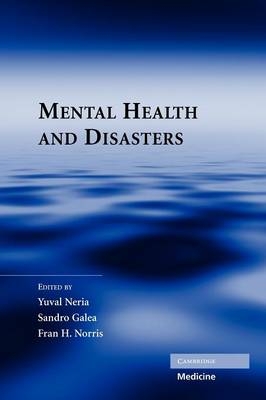
Mental Health and Disasters
Cambridge University Press (Verlag)
978-0-521-88387-0 (ISBN)
Since the attacks of September 11, 2001, disaster preparedness and response has developed into a discrete subspecialty in medicine, and the paramount health care initiative of the US Government. The mental health component of disaster response is a serious subject of study, as trauma is associated with a substantial and long-lasting psychologic burden, both on an individual and community level. The psychopathologies associated with disaster are also quite broad, varying from several different types of post-traumatic stress and anxiety disorders to acute variations of grief-associated depression. This book is the definitive reference on mental health and disasters, focused on the assessment and treatment of the full spectrum of psychopathologies associated with many different types of individual disasters. The logistics for utilizing pre-existing community-based mental health services, as well as the development of new programs, are covered in depth. Case studies and perspectives for improving care, incorporating lessons from Hurricane Katrina and 9/11, are included in detail.
Yuval Neria, PhD, is Associate Professor of Clinical Psychology at Columbia University and Associate Director of Trauma Studies and Services at the New York State Psychiatric Institute, New York. Sandro Galea, MD, DrPH, is Professor of Epidemiology at the School of Public Health and Research Professor at the Institute for Social Research at the University of Michigan, Ann Arbor. Fran H. Norris, PhD, is Research Professor in the Department of Psychiatry at Dartmouth Medical School, Lebanon, New Hampshire, and is also affiliated with the National Center for PTSD and the National Consortium for the Study of Terrorism and Responses to Terrorism (NC-START) at the University of Maryland.
1. Disaster mental health: exposure, impact, and responses; Part I. Concepts: 2. Disaster mental health research - past, present, and future; 3. The experience of disaster: trauma, loss, adversities, and community effects; Part II. Psychopathology after Disasters: 4. Anxiety disorders and PTSD; 5. Physical health problems after disasters; 6. Substance use and misuse after disaster: prevalences and correlates; 7. Depression and prolonged grief in the wake of disasters; 8. What is psychopathology after disasters? Considerations about the nature of the psychological and behavioral consequences of disease; Part III. Vulnerability and Resilience: 9. Resilience after disaster; 10. Social and cognitive frameworks for understanding the mental health consequences of disasters; 11. Distinctions that matter: received social support, perceived social support, and social embeddedness after disasters; Part IV. Special Groups: 12. Women and disasters; 13. Child mental health in the aftermath of disaster: a review of PTSD studies; 14. Disaster mental health in older adults: symptoms, policy, and planning; 15. The effects of disaster on the mental health of individuals with disabilities; 16. Factors associated with exposure and response to disasters among marginalized populations; 17. Journalism and media during disasters; 18. Uniformed rescue workers responding to disaster; Part V. Interventions and Health Services: 19. Mental health treatments in the wake of disaster; 20. Evidence-based long-term treatment of mental health consequences of disaster among adults; 21. Mental health care for children in the wake of disasters; 22. Utilization of mental health services after disasters; Part VI. Case Studies; Section 1. Natural Disasters: 23. The mental health impact of the Southeast Asia tsunami; 24. Advances in our understanding of earthquake trauma and its treatment - a self-help model of mental health care for survivors; 25. Hurricane Katrina; Section 2. Technological Disasters: 26. The long-term mental health impacts of the Chernobyl accident; 27. The Exxon Valdez oil spill; 28. Enschede fireworks disaster; Section 3. Mass Violence: 29. Eyewitness to mass murder: findings from studies of four multiple shooting episodes; 30. The Oklahoma City bombing; 31. The terrorist attacks of September 11, 2001, in New York; 32. The psychological consequences of the London bombings; 33. Psychological responses to terrorism in Israel: 2000–4; Part VII. Questions and Directions: 34. Methodological challenges in studying the mental health consequences of disasters; 35. Community burden of disability and disease.
| Verlagsort | Cambridge |
|---|---|
| Sprache | englisch |
| Maße | 178 x 254 mm |
| Gewicht | 1300 g |
| Themenwelt | Medizin / Pharmazie ► Medizinische Fachgebiete ► Notfallmedizin |
| Medizin / Pharmazie ► Medizinische Fachgebiete ► Psychiatrie / Psychotherapie | |
| Studium ► Querschnittsbereiche ► Prävention / Gesundheitsförderung | |
| Sozialwissenschaften ► Soziologie | |
| ISBN-10 | 0-521-88387-3 / 0521883873 |
| ISBN-13 | 978-0-521-88387-0 / 9780521883870 |
| Zustand | Neuware |
| Haben Sie eine Frage zum Produkt? |
aus dem Bereich


